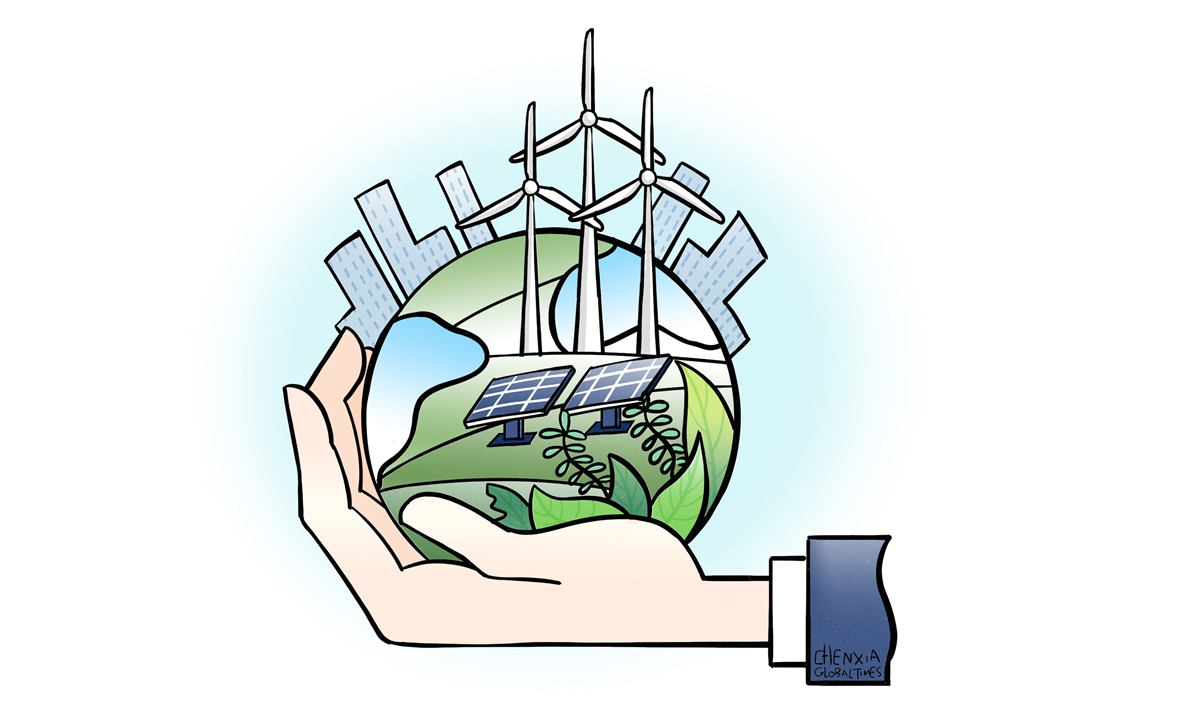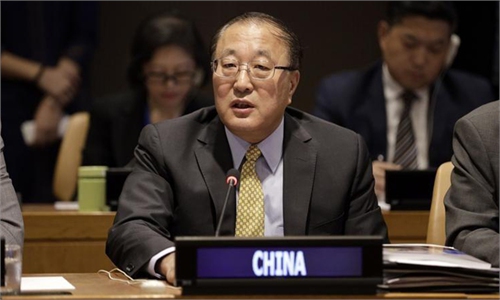
Illustration: Chen Xia/Global Times
It is indisputable that our planet is becoming hotter and we are exposed to rising risk of heat stress in the summertime because of global climate change. Temperatures on Earth are predicted to soar to record highs over the next five years, driven by human-caused greenhouse gas emissions, forecasters at the World Meteorological Organization said in a report released on May 17.
Countries across a huge swatch of South and Southeast Asia suffered surging temperatures in April this year, prompting warnings from scientists that 2023 could set new temperature records as the planet's climatic patterns change and global warming intensifies.
The unprecedented heat wave that had battered Thailand, Bangladesh, India, Laos and Vietnam was deemed as directly resulting from human-induced climate change, typically through burning fossil fuel and emitting heat-trapping carbon dioxide. In Vietnam, temperatures hit 44.2 C on May 6 in the country's northern Tuong Duong, media reports said.
In the summer of 2021, heightened temperatures helped fuel a protracted and damaging heat wave in the Pacific Northwest that had shattered local mercury records and killed hundreds of elderly people in British Columbia and the northwestern US states of Washington and Oregon.
These heat waves would have been virtually impossible if there were no influence of climate change, claimed meteorology scientists who had warned that it is only a matter of time before millions are decimated by another extreme heat event. That disaster could strike in Asia, Europe or America, the parts of the planet with large and dense populations.
As a matter of fact, climate change is driving global temperatures to levels that humanity has never experienced previously. Increasingly, we feel summertime heat that is so suffocating and unbearable that we want to bury our heads in cool water or hide ourselves in an air-conditioned room. It is not difficult to sense what could happen if large populations are exposed to unprecedented heat and humidity stress on a more frequent basis.
The recent record was set in 2016 that our planet suffered the hottest year measured by experts. Now, the World Meteorological Organization scientists warn that there is a 98 percent chance that at least one of the next five years will surpass 2016 in terms of temperature, while the average temperature from 2023 to 2027 will almost certainly be the warmest for a five-year period ever recorded.
In order to prevent our planet from further warming, global leaders must put aside their political disputes and ideological confrontations, and try to mitigate climate change by joining hands to do "real things" to curb carbon dioxide and other greenhouse gases emissions. The target set by the Paris Climate Control Conference to cap global temperature' rise within 2 C from the preindustrial age must be met.
Global average temperatures have already increased approximately 1.2 C since 1900, an ominous sign for humanity. From now on, even a small increase in the mercury can exacerbate the dangers and calamities from extreme heat waves, engulfing wildfires, severe drought, melting glaciers, inundated islands and even inundated low-lying countries. It is a reality that the people of Asia know only too well. The worst heat waves in Asian history were just a taste of the worsening climate impact we will have to face in the years to come.
Until overall greenhouse gas emissions are put under controll, global temperatures will continue to rise, and catastrophic weather patterns will become more frequent, which will damage our planet and have far-reaching repercussions for people's health, food security, water management and livestock survival.
Facing the menace of accelerated global warming, world leaders, years ago, agreed to launch concerted efforts to realize the 1.5 C limit to keep the risks of climate change within tolerable levels.
However, in the past few years, nations have largely delayed or did too little in making significant changes necessary to achieve this goal, failing to drastically cutting fossil fuel uses.
The world should also consider shifting our measure of the annual economic growth from gross domestic product to a more ecologically focused metrics, say, gross ecologic-economic growth or genuine sustainability growth. The latest synthesis report from the International Panel on Climate Change makes for grim reading - every fraction of a degree of warming comes with escalated threats, from deadly heat waves to shrinking farm harvests, affecting economies and communities around the world.
There is a silver lining regarding the world's fight against climate change. China and Europe are leading the global efforts in expanding solar panels and wind turbines and other forms of clean energy. China is the front-runner in vigorously pushing for electric vehicles (EVs) to supplant petrol run cars, buses and trucks. Now, China-made EVs are entering the domestic and global market en masse. By the end of this year, the penetration rate of EVs is expected to surpass one-third across the Chinese market, analysts said.
The recent energy crisis has kicked renewable energy into a new phase of accelerated development. There is now an opportunity to leverage this momentum and turn it into a cascading revolution that should envelop our planet, which will help our planet stave off carbon dioxide emissions.
Nothing short of a breakthrough will give us a good chance of halting catastrophic global warming. Every government needs to raise their stake in dealing with this crisis. Every business needs to transform. Every individual needs to act.
There is nothing more critical to our collective global stability than what's going to happen to the planet's atmosphere. If we continue to sit idle or even escalate carbon emissions, the 2 C red line will be breached, meaning more disasters will frequent us - heat waves one after another, devastating desertification, less rainfall, crop failure and deaths.
The author is an editor with the Global Times. bizopinion@globaltimes.com.cn



